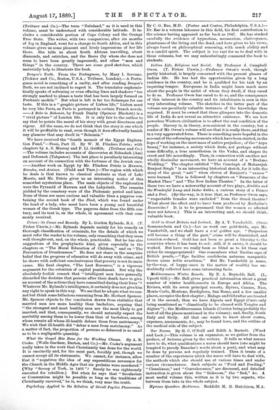Crime : its Cause and Remedy. By L. Gordon Rylands,
B.A. (T. Fisher Unwin.)—Mr. Rylands depends mainly for his remedy on thorough classification of criminals, for the details of which we must refer the reader to his volume, only remarking that they seem well thought-out, and, on the whole, practicable. But he has also suggestions of the prophylactic kind, given especially in the chapters on "The Moral Education of Children," and on "The Prevention of Drunkenness." He does not share in the sanguine belief that the progress of education will do away with crime, and he shows with sufficient conclusiveness that poverty is not its main cause. His final chapter, "The Last Resource," is a vigorous argument for the retention of capital punishment. But why the absolutely foolish remark that " intelligent men have generally discarded the doctrine that persons after their death have to give an account of the actions they have committed during their lives "? Whatever Mr. Rylands's intelligence, it certainly does not give him any right to speak in this way. We see that he adopts what we can- not but think some fallacious reasoning from Mr. Herbert Spencer. Mr. Spencer objects to the conclusion drawn from statistics that married men are more healthy than bachelors, arguing that " the strongest and most healthy men are the most likely to get married, and that, consequently, we should naturally expect the mortality among them to be lower than that of bachelors, among whom remain all whose ill-health debars them from matrimony." We wish that ill-health did "debar a man from matrimony." As a matter of fact, the proportion of persons so debarred is so small as to be a negligeable quantity.


































 Previous page
Previous page